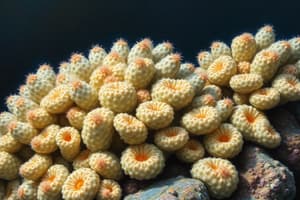Podcast
Questions and Answers
What is the common name for members of the phylum Porifera?
What is the common name for members of the phylum Porifera?
- Sea urchins
- Corals
- Jellyfish
- Sponges (correct)
Which structure in sponges is responsible for water entry?
Which structure in sponges is responsible for water entry?
- Choanocytes
- Spongocoel
- Ostia (correct)
- Osculum
What type of symmetry do most sponges exhibit?
What type of symmetry do most sponges exhibit?
- Asymmetry (correct)
- Pentamerism
- Radial symmetry
- Bilateral symmetry
What supports the body structure of sponges?
What supports the body structure of sponges?
How do sponges reproduce asexually?
How do sponges reproduce asexually?
What is a characteristic feature of sponge development?
What is a characteristic feature of sponge development?
Flashcards are hidden until you start studying
Study Notes
Phylum Porifera
- Members of this phylum are commonly known as sponges, which are generally marine and mostly asymmetrical animals.
- They are primitive multicellular animals with a cellular level of organisation.
- Sponges have a water transport or canal system, which consists of minute pores (ostia) in the body wall that lead to a central cavity called the spongocoel, and then out through the osculum.
- The water transport system is useful for food gathering, respiratory exchange, and removal of waste.
- Choanocytes or collar cells line the spongocoel and canals.
Body Structure
- The body is supported by a skeleton made up of spicules or spongin fibres.
Reproduction
- Sponges are hermaphrodites, meaning they produce both eggs and sperm.
- They can reproduce asexually by fragmentation and sexually by forming gametes.
- Fertilisation is internal, and development is indirect, involving a larval stage that is morphologically distinct from the adult.
Examples of Porifera
- Examples of sponges include Sycon, Euspongia, and Spongilla.
Studying That Suits You
Use AI to generate personalized quizzes and flashcards to suit your learning preferences.




